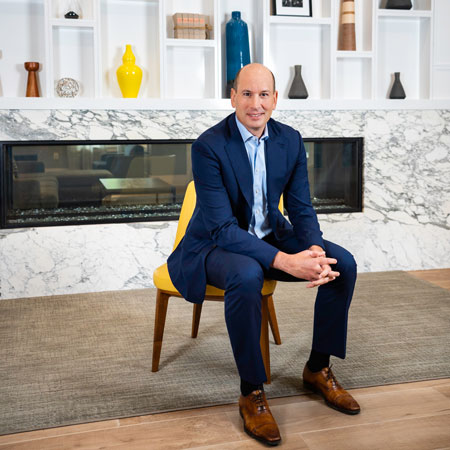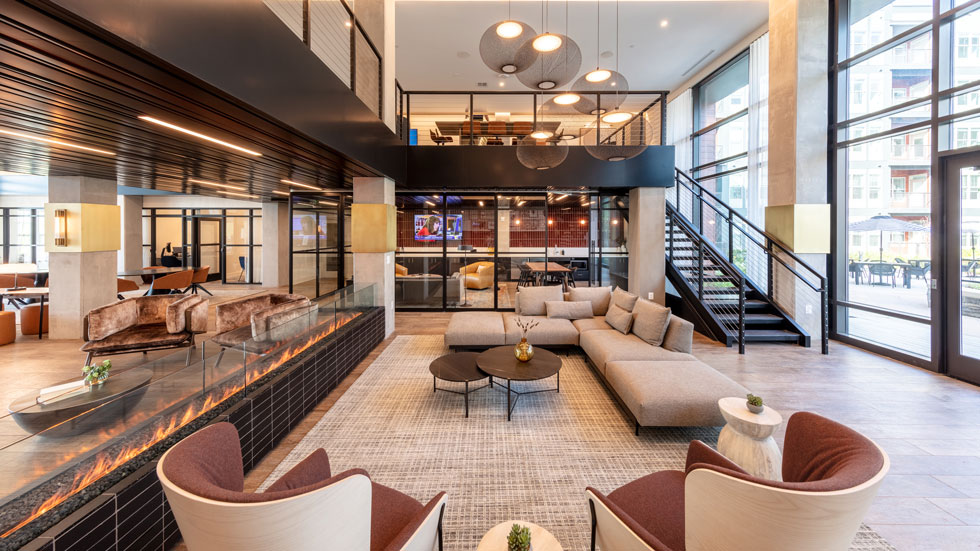AvalonBay Communities has, for more than three decades, built a unique purpose and values-driven culture. Its new CEO Benjamin Schall sees himself as the next steward of that evergreen culture.
Benjamin Schall's first year transition into his new role as CEO of AvalonBay Communities, Inc. (NYSE: AVB), a residential REIT headquartered in Arlington, Virginia, in the Washington, DC suburbs, is an experience he values today.
Schall and his family moved from New York to Arlington in January 2021 when Schall joined AvalonBay as president and board member. As part of a planned CEO succession, he embarked on a transition year working alongside Tim Naughton, then chairman and CEO, and the senior team at AvalonBay that ran through January 2022 when Schall officially assumed his current role as chief executive officer and president. (Naughton retired as the REIT’s CEO and is now executive chairman of the board.)
Schall’s transition during the calendar year of 2021 was an immersive experience that led him across the country visiting more than 125 of AvalonBay’s almost 300 apartment communities and experiencing AvalonBay’s culture in his time with the company’s strong regional teams and many of the company’s 3,000 associates.
And Schall has not been afraid to let employees get to know him, either. Across his tours, he blogged to communicate with the organization and is even known to show off his juggling skills. Schall gets together face-to-face with each of the REIT’s groups from time to time. At a recent offsite meeting, he stopped by for a fireside chat, “and one element of that was me showing off my juggling skills,” he noted. Employee relations is truly a two-way street.
Schall recently spoke with REIT magazine about his transition, AvalonBay’s newest expansion regions, and the five key focus areas it is prioritizing right now.
What was the appeal of joining a company like AvalonBay?
AvalonBay is an amazing company. As a longstanding leader in the multifamily and REIT industry, the company has experienced strong growth over the last 30 years. What really makes it special though are the people who work here, our purpose, and our culture, and that was a huge part of the appeal to me.
What differentiates AvalonBay’s culture?
Dick Michaux, AvalonBay’s first CEO, challenged his leadership team at the time to figure out how they could create an evergreen company. What they decided upon was that the company’s culture, driven by its purpose and core values, would be its ultimate differentiator. It was a very conscious choice, grounded in a commitment to a set of core values, which stay very true to us today: spirit of caring, commitment to integrity, and a focus on continuous improvement. They drive our choices, actions, and interactions—how we work with partners, how we connect with residents, and how we relate to each other.
The company culture was fostered by the next set of leaders—Bryce Blair (CEO from 2001-2011) and Tim Naughton (CEO from 2011-2021)—and the strength of AvalonBay’s culture is so embedded in its associates that it continues beyond any one leader. In many ways, I see my role here as the current steward of that culture, championing it so we can continue to strengthen it and, together as a team of associates, strive to achieve our purpose of creating a better way to live. AvalonBay’s purpose really inspires me, and everyone throughout the organization, every day.
Who has cultivated you throughout your career, leading you to this point?
I’ve been fortunate to have a number of meaningful mentors during my career. People who have taken that extra step with me, supported me, and provided me with opportunities. Most recently as part of my planned transition, I’ve had the good fortune to partner and learn from Tim [Naughton], and I do consider him a mentor.
He’s been amazingly thoughtful in supporting me through the learning curve and as I got to know the organization and integrate myself into the CEO role. That’s been key. A transition year also provided me the opportunity to spend a ton of time with our teams, touring many of our communities and all our regions. I toured 125 of our almost 300 communities. Going back to the importance of people and culture, which provided time for me to connect with people, both in the field and at the corporate level.
Were you excited to have that time during your transition year?
I’m thankful to have had the time during my first year to invest in developing relationships across the organization. I look back on my transition into the CEO role and realize how fortunate I was to have had the time to make that transition, and to be able to take the time to invest in people as deeply as I was able to and get to know our culture and business at a different level. I do feel as though it positioned me when I stepped into the CEO role this past January [2022], to be doing it with a different set of relationships and a strength of relationships that I otherwise wouldn’t have been able to have.
How does AvalonBay’s business operate on a day-to-day basis?
We own and operate all our communities. In total, that’s about 90,000 apartments across the country. Two-thirds of those communities are in the suburbs, and historically we’ve been primarily on the coasts; more recently we’ve also been growing in new regions. For the last three or four years, that’s included Southeast Florida and Denver; and in the last year or so, we’ve been growing in Austin, Dallas, and North Carolina. Right now, these areas—we call them our expansion regions—are about 5% of our portfolio, and our goal over the coming years is to grow that percentage of our portfolio to about 25%.
We’re also, and very importantly, the most active developer of the public peers. If you look over the fuller REIT landscape, we’re one of only a few developers that has been able to be successful developing for more than 30 years, through various cycles. There are several reasons behind that, but one of the key differentiators for us is what we consider to be the powerful combination of strategic capabilities and centralized corporate resources, with the strength of our longstanding regional, market-based teams who have deep local market knowledge and experience.
How is your approach to working with your local teams perhaps different from some of your competitors?
The approach that we take is it’s those teams—our operators and our developers in the markets—that are best suited to make the micro or local capital allocation decisions; and we’re here to support them and allocate financial and human capital to each of those markets.
The other part that excites all of us as developers, and this is particularly true in today’s environment with people working from home and an increased importance on the general home environment, is that being an active developer allows us to continue to evolve our product—where we build, what we build, how we think people are going to utilize that space. That’s an area of focus for us right now as well.
What are some of the company’s goals over the next five to 10 years? What are your goals as its leader?
There are five key focus areas that we’re prioritizing right now as we set the course for this year and over the coming years. First, we will be continuing to leverage our development DNA as a meaningful driver of growth and value creation. We do that in our established and expansion regions and by providing capital to other developers.
Second, we are focused on optimizing our portfolio as we grow, and that involves our continued push into the suburbs, as well as our growth in the expansion regions. As part of that process, we’re also recycling capital by pruning the portfolio of older assets that have higher capex profiles and reallocating that capital into our new regions and into development.
Our third focus area includes making significant investments in transforming our operating model, including innovation and technology. We’ve identified 200 basis points of margin improvement from those efforts over the next couple of years. Our goal is to provide enhanced value to our residents while also maximizing operating efficiencies.
Our fourth area of focus is our continued leadership in ESG. AvalonBay has been a longstanding leader in the REIT space for ESG. We’ve just published our 11th annual Environmental, Social and Governance Report, which includes updates on our progress on the vision we set for inclusion and diversity, as well as our science-based targets that we set for reducing emissions.
Finally, our fifth and most important area of focus, which is at the core of what we do and the core of all our success, is our continued investment in our people and our culture.
What about hobbies? Do you have any that would surprise your colleagues?
My wife and I started to get into tennis during the pandemic. I really enjoy it at this point, both the competitive nature and the full body workout of it. I also find there’s a Zen aspect to staying present for each and every shot during tennis. One of my recent reads, and a book I’ve been recommending, is on the topic of staying present in the moment: The Inner Game of Tennis by W. Timothy Gallwey.
What’s the best career advice you’ve ever received?
One of the best pieces of career advice that I’ve ever received was in the form of another book recommendation. It’s called Mindset by Carol Dweck, and it meaningfully changed and reinforced my professional outlook and approach; but, also, my personal outlook, including as a parent. This was a book recommendation I received about 10 years ago, and it’s one I refer back to and reread from time to time. I recommend it often, particularly when others are going through a change in their life.
The premise of the book is that a growth mindset can really focus you on learning from your successes and failures; and in that way, you can improve, you can learn, and you can change. Particularly in times of change, I find that framework very powerful. It’s also an outlook that connects very closely to one of AvalonBay’s core values: a focus on continuous improvement and how we as an organization keep challenging ourselves to do better. That can range from how we do better in serving our residents to how do we do better in the types of communities that we develop


